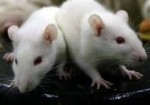by Guest Blogger OmegaMan
 Ever heard of Psychiatrist Curt Richter? He studied the consequences of emotional stress when trying to survive. He noticed that when living things are subjected to great pressure, many will just give up and die. If the stress was psychological, then why did the subjects mind and body appear to collapse?
Ever heard of Psychiatrist Curt Richter? He studied the consequences of emotional stress when trying to survive. He noticed that when living things are subjected to great pressure, many will just give up and die. If the stress was psychological, then why did the subjects mind and body appear to collapse?
In short, Richter was experimenting putting rats in a tub of water. At room temperature the rat could swim about 80 hrs non-stop before giving up. If he stressed the rat by lowering or raising the water temperature or even blowing air into its face, a rat could still swim between 20 and 40 hrs. He also found that once a rat picked its direction, it would generally stick with either a clockwise or counter clockwise direction without changing. Many things from ants to lobsters will do this if one or their antennae or whiskers are cut also.
Richter decided to study the effects on direction by cutting the whiskers on just one side of a rats face. By accident…guess what they discovered?  The rat swam for only a few minutes, gave up and sank to the bottom! Just for the record, they actually rescued it.
The rat swam for only a few minutes, gave up and sank to the bottom! Just for the record, they actually rescued it.
How could this happen? What effect could cutting whiskers have on survival longevity? Well, upon investigation, it wasn’t so much in the cutting of the whiskers as it was in the procedure. He found that his assistants had un-intentionally frightened and stressed the rat by first capturing it in a firmly held black bag and then dropping it into water. It was the “trauma” induced fear response that had sent the rat into over stimulated exhaustion.
Curt Richter also found if he removed the rat just before sinking, let it rest for a few minutes, the rat would relax and seem to realize it in fact that it could survive. If thrown back into the water, it could swim for hours. If it was allowed to play with the stressful black bag first and then thrown back into the water and rescued several times…its survival training would cause it to perform better than those rats without training. Interesting how this relates to the survivability of humans thrown into their own survival situation.
In summary, it was concluded that momentary “HOPE” had an extreme influence on helping the body & mind, cope with an adverse survival situation.
Remember…Never panic! Never give up…!

Im getting much ideas after reading your post, thank you
Today people are so much concerned about surviving in the disaster. But really people need perfect for doing this. . People should be well-known about surviving in any disaster
Thank you for another informative web site.
I simply want to mention I am just new to blogs and truly savored you’re web-site. More than likely I’m planning to bookmark your blog . You surely have outstanding posts. Appreciate it for sharing your blog site.
Please do, Thank You.
PS. Please LIKE us on facebook LINK
Howdy! Would you mind if I share your blog with my facebook group? There’s a lot of folks that I think would really enjoy your content. Please let me know. Cheers